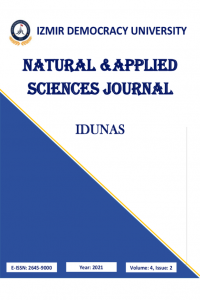Abstract
References
- Awad, M. A., & Khalil, I. (2012). Prediction of user's web-browsing behavior: Application of markov model. IEEE Transactions on Systems, Man, and Cybernetics, Part B (Cybernetics), 42(4), 1131-1142.
- Budnikas, G. (2015). Computerised recommendations on e-transaction finalisation by means of machine learning. Statistics in Transition. New Series, 16(2), 309-322.
- Carmona, C. J., Ramírez-Gallego, S., Torres, F., Bernal, E., del Jesus, M. J., & García, S. (2012). Web usage mining to improve the design of an e-commerce website: OrOliveSur. com. Expert Systems with Applications, 39(12), 11243-11249.
- Chen, T., & Guestrin, C. (2016, August). Xgboost: A scalable tree boosting system. In Proceedings of the 22nd acm sigkdd international conference on knowledge discovery and data mining (pp. 785-794).
- Fernandes RF, Teixeira CM (2015) Using clickstream data to analyze online purchase intentions. Master’s thesis, University of Porto.
- Freund, Y., & Schapire, R. E. (1997). A decision-theoretic generalization of on-line learning and an application to boosting. Journal of computer and system sciences, 55(1), 119-139.
- Friedman, J. H. (2001). Greedy function approximation: a gradient boosting machine. Annals of statistics, 1189-1232.
- Kau, A. K., Tang, Y. E., & Ghose, S. (2003). Typology of online shoppers. Journal of consumer marketing, 20(2), 139-156.
- Köktürk Güzel, B. E., & Önder, D. (2018, May). Performance comparision of boosting classifiers on breast termography images. In 2018 26th Signal Processing and Communications Applications Conference (SIU) (pp. 1-4). IEEE.
- Moe, W. W. (2003). Buying, searching, or browsing: Differentiating between online shoppers using in-store navigational clickstream. Journal of consumer psychology, 13(1-2), 29-39.
- Sakar, C. O., Polat, S. O., Katircioglu, M., & Kastro, Y. (2019). Real-time prediction of online shoppers’ purchasing intention using multilayer perceptron and LSTM recurrent neural networks. Neural Computing and Applications, 31(10), 6893-6908.
- Statistica 2020 - https://www.statista.com/statistics/187439/share-of-e-commerce-sales-in-total-us-retail-sales-in-2010/
Abstract
Data driven marketing is becoming more and more vital for businesses day-by-day. Understanding customer behavior has the potential to decrease marketing costs as well as increase sales both in conventional marketing and online marketing. Since online users can access information faster, prices have become more competitive and customer behavior analysis has become more important. The purpose of this study is to predict the purchase interest of the users in an e-commerce web page by using the user session data such as pageview, duration etc. To this aim we used clickstream data for an e-commerce web page which is publicly available. Since only 16.5 percent of the sessions are completed with purchase in the dataset, increasing true positive rates rather than accuracy is more important. To this aim, we have explored the performance of boosting algorithms on the dataset and compared to those of state-of-the-art methods that were previously applied on the same dataset. Results show that boosting algorithms have better performance for identification of the sessions that end with a purchase.
Keywords
Online shopping intention prediction boosting algorithms adaboost gradient boosting extreme gradient boosting
References
- Awad, M. A., & Khalil, I. (2012). Prediction of user's web-browsing behavior: Application of markov model. IEEE Transactions on Systems, Man, and Cybernetics, Part B (Cybernetics), 42(4), 1131-1142.
- Budnikas, G. (2015). Computerised recommendations on e-transaction finalisation by means of machine learning. Statistics in Transition. New Series, 16(2), 309-322.
- Carmona, C. J., Ramírez-Gallego, S., Torres, F., Bernal, E., del Jesus, M. J., & García, S. (2012). Web usage mining to improve the design of an e-commerce website: OrOliveSur. com. Expert Systems with Applications, 39(12), 11243-11249.
- Chen, T., & Guestrin, C. (2016, August). Xgboost: A scalable tree boosting system. In Proceedings of the 22nd acm sigkdd international conference on knowledge discovery and data mining (pp. 785-794).
- Fernandes RF, Teixeira CM (2015) Using clickstream data to analyze online purchase intentions. Master’s thesis, University of Porto.
- Freund, Y., & Schapire, R. E. (1997). A decision-theoretic generalization of on-line learning and an application to boosting. Journal of computer and system sciences, 55(1), 119-139.
- Friedman, J. H. (2001). Greedy function approximation: a gradient boosting machine. Annals of statistics, 1189-1232.
- Kau, A. K., Tang, Y. E., & Ghose, S. (2003). Typology of online shoppers. Journal of consumer marketing, 20(2), 139-156.
- Köktürk Güzel, B. E., & Önder, D. (2018, May). Performance comparision of boosting classifiers on breast termography images. In 2018 26th Signal Processing and Communications Applications Conference (SIU) (pp. 1-4). IEEE.
- Moe, W. W. (2003). Buying, searching, or browsing: Differentiating between online shoppers using in-store navigational clickstream. Journal of consumer psychology, 13(1-2), 29-39.
- Sakar, C. O., Polat, S. O., Katircioglu, M., & Kastro, Y. (2019). Real-time prediction of online shoppers’ purchasing intention using multilayer perceptron and LSTM recurrent neural networks. Neural Computing and Applications, 31(10), 6893-6908.
- Statistica 2020 - https://www.statista.com/statistics/187439/share-of-e-commerce-sales-in-total-us-retail-sales-in-2010/
Details
| Primary Language | English |
|---|---|
| Subjects | Engineering, Electrical Engineering |
| Journal Section | Articles |
| Authors | |
| Publication Date | December 31, 2021 |
| Acceptance Date | June 30, 2021 |
| Published in Issue | Year 2021 Volume: 4 Issue: 2 |

